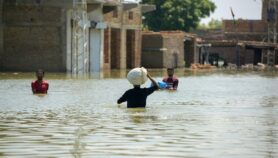By: T.V. Padma
Send to a friend
The details you provide on this page will not be used to send unsolicited email, and will not be sold to a 3rd party. See privacy policy.
[NEW DELHI] Natural coastal ecosystems have been widely destroyed by the planting of alien trees in the mistaken belief that they will work as ‘bioshields’ against storms and tsunamis, says an international group of scientists.
The team, writing in the February issue of Conservation Letters, reviewed more than 30 papers on the planting of belts of trees as bioshields.
The researchers concluded that there is little evidence to show they protect against storm surges — temporary increases in sea level associated with stormy winds — or tsunamis.
Additionally, using foreign tree for this purpose is doing extraordinary environmental damage, they said.
The review adds to the debate on bioshields’ protective role (see Mangroves ‘protect coastal villages during cyclones’ and Mangroves ‘do not protect against tsunamis’).
Although there is evidence for the ability of vegetation to help protect coastlines from erosion caused by conventional waves, the study said, the damage inflicted by extreme events is actually caused by rising water rather than waves — and there has been little rigorous, properly-controlled research into this.
Planting trees helps stabilise the soil in the short term in most cases, the researchers said, but this is offset by the ecological instability of planting foreign species.
In Andra Pradesh in India, for example, international grants have been used to plant alien Casuarina trees, and while these may provide firewood for locals, they are also known to invade mangrove ecosystems and have a negative effect on tropical birds.
Also in India, features such as sand dunes that could offer some natural protection are being bulldozed to make way for foreign species of trees, Kartik Shanker, assistant professor in the school of ecological sciences at the Indian Institute of Science, Bangalore, and a co-author of the study, told SciDev.Net.
"There is a difference between restoring native vegetation such as mangroves that are naturally adapted to the dynamic conditions on local coastlines around the world, and introducing alien trees purely for the purpose of trying to stabilise a coastline," said Rusty Feagin, visiting associate professor of Forest Science at Texas A & M University in the United States.
"It appears that long-standing political agendas … have driven bioshield policiesin many developing countries," the authors observed. For example, Tamil Nadu state in India has simply used international funds to support its decade-old policy of promoting Casuarina plantations, they argued.
The researchers called for changes in bioshield policies so that they are driven by science, involve careful selection of coastal sites and place native trees in appropriate locations.
References
Conservation Letters doi 10.1111/j.1755-263X.2009.00087.x (2010)













